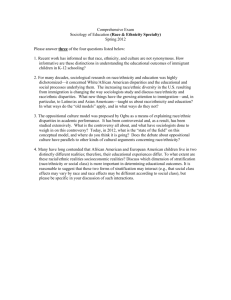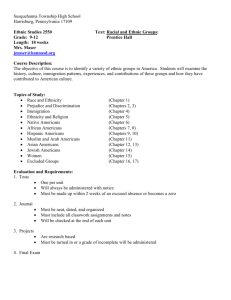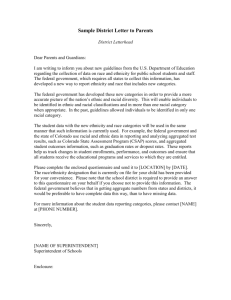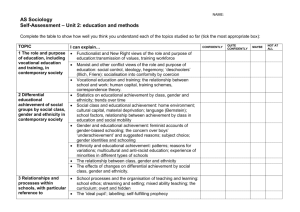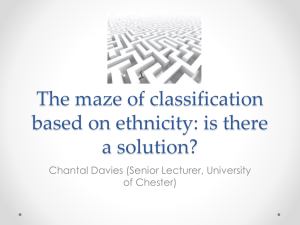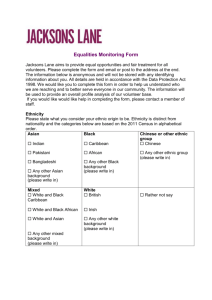Business behaviours and the ethnic entrepreneurs: an intra
advertisement
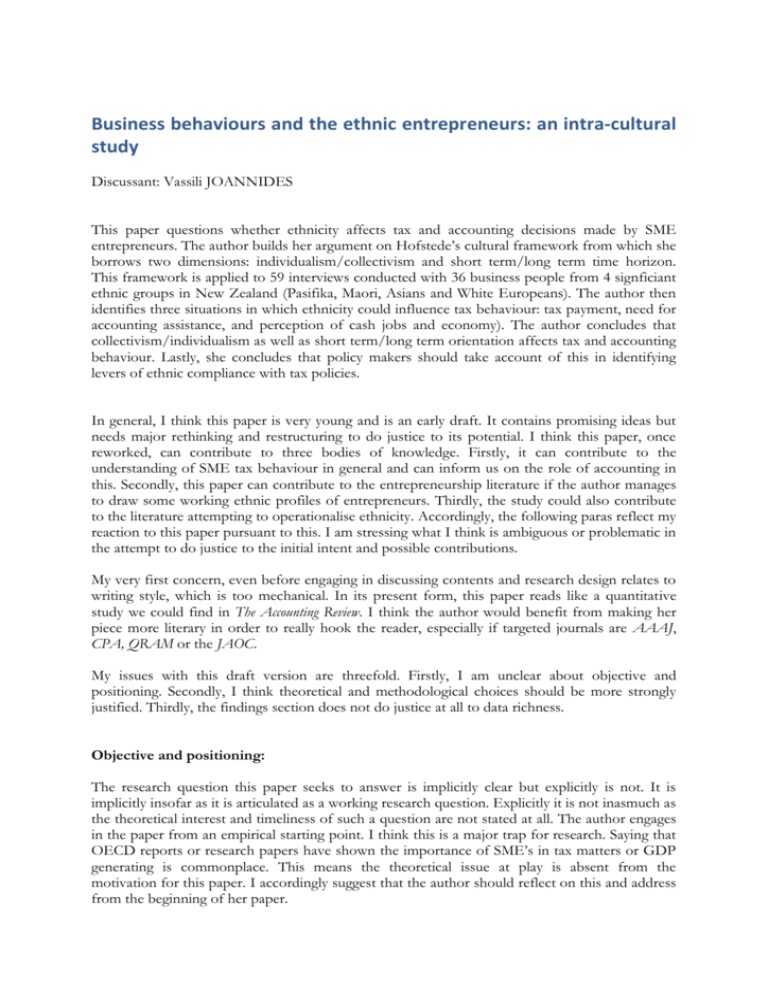
Business behaviours and the ethnic entrepreneurs: an intra-cultural study Discussant: Vassili JOANNIDES This paper questions whether ethnicity affects tax and accounting decisions made by SME entrepreneurs. The author builds her argument on Hofstede’s cultural framework from which she borrows two dimensions: individualism/collectivism and short term/long term time horizon. This framework is applied to 59 interviews conducted with 36 business people from 4 signficiant ethnic groups in New Zealand (Pasifika, Maori, Asians and White Europeans). The author then identifies three situations in which ethnicity could influence tax behaviour: tax payment, need for accounting assistance, and perception of cash jobs and economy). The author concludes that collectivism/individualism as well as short term/long term orientation affects tax and accounting behaviour. Lastly, she concludes that policy makers should take account of this in identifying levers of ethnic compliance with tax policies. In general, I think this paper is very young and is an early draft. It contains promising ideas but needs major rethinking and restructuring to do justice to its potential. I think this paper, once reworked, can contribute to three bodies of knowledge. Firstly, it can contribute to the understanding of SME tax behaviour in general and can inform us on the role of accounting in this. Secondly, this paper can contribute to the entrepreneurship literature if the author manages to draw some working ethnic profiles of entrepreneurs. Thirdly, the study could also contribute to the literature attempting to operationalise ethnicity. Accordingly, the following paras reflect my reaction to this paper pursuant to this. I am stressing what I think is ambiguous or problematic in the attempt to do justice to the initial intent and possible contributions. My very first concern, even before engaging in discussing contents and research design relates to writing style, which is too mechanical. In its present form, this paper reads like a quantitative study we could find in The Accounting Review. I think the author would benefit from making her piece more literary in order to really hook the reader, especially if targeted journals are AAAJ, CPA, QRAM or the JAOC. My issues with this draft version are threefold. Firstly, I am unclear about objective and positioning. Secondly, I think theoretical and methodological choices should be more strongly justified. Thirdly, the findings section does not do justice at all to data richness. Objective and positioning: The research question this paper seeks to answer is implicitly clear but explicitly is not. It is implicitly insofar as it is articulated as a working research question. Explicitly it is not inasmuch as the theoretical interest and timeliness of such a question are not stated at all. The author engages in the paper from an empirical starting point. I think this is a major trap for research. Saying that OECD reports or research papers have shown the importance of SME’s in tax matters or GDP generating is commonplace. This means the theoretical issue at play is absent from the motivation for this paper. I accordingly suggest that the author should reflect on this and address from the beginning of her paper. The research question, as is, does not enable me to grasp the major in this paper: tax and accounting decisions, ethnicity or SME entrepreneurship? I dare to believe that for an accounting audience the major should tax and accounting choices. Thence, the author should probably point to what is known and what needs knowing in this regard. This ambiguity is perpetuated and aggravated by the literature review, which is problematic to me for three reasons. Firstly, it reads too mechanically: the procession of “such-and-such said” does not help the reader understand the problem. Rather than providing such a procession of research conclusions, I reckon the author should show the major streams of thoughts in the literature and how they position themselves vis-à-vis each other. This would enable the reader to understand how the author herself positions her research. This would help the author state more clearly the type of theoretical contribution to knowledge she expects. In other words, it is for now crucial to clarify paper major and the knowledge debate you are addressing. Your literature review for now does not inform on this. Evident for this is your final claim pp.9-10 which in my opinion should have been announced at the beginning of your literature review; this is the key to understanding this literature review. I am not keen on demonstration following a “then, then, then” format. I think announcing where you are coming from at the beginning and then justifying it is more engaging and convincing. This difficulty is perpetuated by the structure of this literature review. I do not understand the procession of authors quoted and the order of sub-sections. I think the three sub-sections are quite redundant as they all address the same things almost form the same viewpoint. You could then merge them into one and then show more accurately what is known and needs knowing on the three facets of your paper: ethnicity accounting research, tax behaviour research, entrepreneurship in accounting research. Your paper is at the crossing of these three bodies of literature. This deserves to be made explicit. See the below figure: your paper and your contribution can be found in you addressing the blue triangle. Thence, I think you should explicitly show the core theoretical issues at play in each circle, then identify issues when they are crossed two by two and ultimately arrive at your research question and contribution in the blue triangle. Theory and methodology choices: The author makes strong theory and methodology choices that can be bitterly critiqued. Therefore, I suggest reinforcing justification for such choices. Just saying that you are using Hofstede because it has become the dominant approach in management studies is not acceptable from an academic viewpoint. We are not meant to replicate prior studies and abide by everything written before we conduct our own research. Saying that this model is convenient is not acceptable either. Accordingly, you should justify why it is particularly appropriate in your very case. I personally think Hofstede’s model impairs your work in lieu of upholding it. Your claim page 12 that there is no alternative framework totally neglects cultural research published by AOS, AAAJ and CPA for almost 20 years. What about Cultural Political Economy (anything written by Alawattage or Wickramasinghe), Geertz’ approach (anything written by Hopper or Hasri), Mary Douglas’ framework, or cultural anthropology (e.g. Greer’s writings on Aborigines). This claim should be profoundly revised. This model reduces culture to values. These are then reduced to five dimensions. These two aspects of the model have been bitterly critiqued, as you allusively mention. Why then are reducing these values to two? I see no justification for this choice, which makes is unpersuasive for now. Look at Jean Ding & Stolowy (2005) when they decide to focus only on two dimensions of the model and justify their approach. Also, Hofstede’s model is problematic as it applies to cultural groups predetermined items through strong etic categories. Yet, cultural research is aimed at identifying what is specific to a cultural group through emic categories (see Bhimani, 1999; Efferin & Hopper, 2007, Alawattage & Wickramasinghe, 2008). This is particularly vivid in research dealing with ethnicity. For now you are killing the richness of ethnicity as a working concept for culture. You equate the two and reduce them to two dimensions form Hofstede… Moreover, your definition of ethnicity does not do justice to what makes it differ from race (objective/subjective; etic/emic, etc.) You should either cut ethnicity and take responsibility for culture. Or you should totally revisit your concept of ethnicity, borrowing from Efferin & Hopper (2007) for instance. I then have a problem with your claims as to where each of the four ethnicities you scrutinise fit in Hofstede’s model. Here, you are again killing the notion of ethnicity by assuming through quasi stereotypes that they are this or that. Prove it. As you conducted 59 interviews, you should be able to prove your claim from field observations. The reader must be convinced that it is the case. Methodology choices are also problematic to me too. I think the first para in section 4 is useless and exposes you to critiques. You claim a relativist ontology and subjective epistemology. But anything you wrote beforehand, justifying Hofstede and an etic approach contradicts this claim (see Harris, 1976; 1990; Headland, Harris & pike, 1990; Petterson & Pike, 2002; Pike; 1967, 1990; Goodenough, 1956). Accordingly, you should cut. I think the justification for your sample is too empirical: “it is like this is New Zealand”. Prove it. In order to avoid such a critique, you should provide the reader with a working theoretical or methodological reason for selecting your informants and forming groups. Theoretical justification should be delineated very easily from a working literature review stressing concepts and issues at play. Methodological justification could be found in the fact that you want an expressive case (see Berry, 2005; Joannidès, 2012) or a case evidently representative of the analytical categories you are developing. Next, I am a wee concerned about your sampling: 4 ethnic groups that are predetermined. Why these ones, as you claim New Zealand and Auckland in particular counts over 200 ethnicities? Moreover, your decision to conflate all Pasifikas together and all Asian together contradicts the notion of ethnicity and a critique on cross-cultural study you albeit mentioned earlier. I am unsure if Indones, Japanese, Mainland Chinese, Macao Chinese and Malaysian can be considered the same. They have very little in common. Therefore I think the notion of ethnicity is highly problematic here when it comes to operationalisation. Please tell us more as to the contents of these ethnic groups (people’s origins and how you made the group). Also I am unsure how and why you decided to form three topical groups: tax payment, accounting assistance, and cash economy. This again relates to a lack of clarity in the knowledge debate addressed (see literature review section). Next problem lies in the fact that you have a third layer of analytical categories with business experts, entrepreneurs and tax practitioners. This means that your 36 people fall into 3 x 3 x 4 categories. In other words, for each analytical categories you probably do not have a sufficient amount of informants to reach theoretical saturation. Moreover, what it is the value of a European tax specialist speaking of Pasifika entrepreneurs? What does he or she know about their ethnicity? This constitutes an additional etic layer that cannot do justice to your paper. Rather, I suggest you should either build on cultural anthropology for each of the four groups, provided they are internally homogenous. You should then try to discuss how their ethnic background (not according to Hofstede’s values but anthropological specificities) should influence their perception of entrepreneurship and tax payment. Or, you should rather adopt a grounded theory approach (see Efferin & Hopper, 2007 or Hopper, Wickramasinghe & Rathnasiri, 2005) and let people tell you what makes them behave like they do. In either case, you would have a much stronger methodology, richer empirical section and contribution to knowledge. Findings and discussion The findings section is very superficial and not persuasive at all. You seem to assume that having one quote from each ethnic group would inform you on how cultural background influences their behaviour. This lack of persuasiveness is aggravated by the fact that your quotes only indirectly refer to ethnicity, culture or values and never explicitly shows how these are the explanation for people’s behaviour. Thence, I think you should rather produce quotes in which informants explicate their cultural background, be it based on Hofstede categories or not. Then, you should provide the reader with other excerpts on tax and accounting behaviour. Either you then have other quotes establishing a clear link between these two empirical dimensions. Or you do not and have to rely on cultural anthropology of the considered group to interpret this missing link. And then you have working and convincing findings. My other issue with this section lies in the fact that you seem to make speak of about ethnic groups indifferently people from within and people from without. In one case you can have some idealised or insightful views. In the other you can have prejudices and preconceived views from your informants. In other words, this points to an epistemological and methodological choice that has as yet not been made: etic or emic insights into ethnicity and what this should reveal. You should be clearer with the contribution you expect each type of informant to have to your story or line of argument. Discussion is absent form your paper: I see no confrontation with the literature you mobilised in the literature review. I cannot see how your findings are positioning themselves vis-à-vis prior research and subsequently I cannot have an idea of your contributions. Whence, section 6 is less than convincing, as nothing in the paper comprehensively supports your claims. There is still quite a bit of work but I think this paper has great potential once all these questions have found an answer. Good luck.
